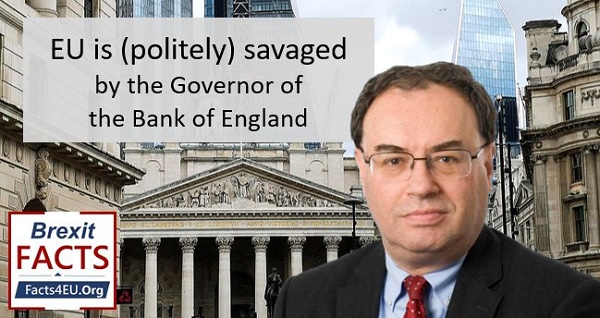EU gets (politely) savaged by the Governor of the Bank of England
Governor implicitly accuses EU of being inconsistent, illogical, dictatorial, and hypocritical

© Brexit Facts4EU.Org 2021
Andrew Bailey fires warning shot ahead of further EU intransigence regarding financial services
Yesterday at the Mansion House in London, the Governor of the Bank of England, Andrew Bailey, gave a speech entitled “The case for an open financial system”. The bulk of the speech was about the EU and its failings.
Below we publish a large part of Mr Bailey’s speech. Readers will be aware that a person in such an important and sensitive position as the Governor of the Bank of England tends to circumspect when making criticisms. Negative insinuations are typically phrased somewhat elliptically. Comments by the Governor can literally move markets.
In this context, some of what the Governor said in his pre-prepared speech was very strong stuff.
Brexit Facts4EU.Org Summary
Bank of England Governor’s speech – a few highlights from comments he made about the EU
- “This is a standard that the EU holds no other country to and would, I suspect, not agree to be held to itself.”
- “This is unrealistic, dangerous and inconsistent with practice.”
- “But that is rule-taking pure and simple. It is not acceptable when UK rules govern a system 10 times the size of the UK GDP…”
- “Indeed, there are other countries, such as the US and Switzerland that have regimes for small banks and have been determined equivalent by the EU in many areas.”
- “I believe we have a very bright future competing in global financial markets underpinned by strong and effective common global regulatory standards.”
The speech itself
The full text of the Governor’s speech is available here. Below Brexit Facts4EU.Org is only publishing the main part which deals with the UK’s relationship with the EU in financial matters. Next month a new “Memorandum of Understanding” on financial services is due to be agreed between the UK and the EU. This is therefore an important speech ahead of that.
“The case for an open financial system”
By Andrew Bailey, Governor of the Bank of England
Excerpts of speech delivered at Mansion House, London, 10 Feb 2021
Note: Emboldening of sentences and sub-headings are all by Brexit Facts4EU.Org.

The European Union has pursued the approach of so-called equivalence, which on the face of it allows for deferring to other authorities where appropriate. The EU’s framework of equivalence in financial services is a patchwork across many different pieces of financial services legislation, taking different forms in different sub-sectors, and in some not present at all. Nor do the equivalence measures prescribe how the judgement should be made.
As is well known, the post-Brexit equivalence process between the UK and EU has not been straightforward. It is, of course, two distinct processes – one for the UK to recognise the EU as equivalent to the UK, and one for vice versa. The UK has granted equivalence to the EU in some areas, but the EU has not done likewise to the UK. In a few areas – involving central clearing and settlement – there has been agreement by the EU to extend temporary equivalence to the UK, recognising, I think, the clear risks to financial stability that would have arisen had this not been done at the outset.
It would be reasonable to think that a common framework of global standards combined with the common basis of the rules – since the UK transposed EU rules from the outset – would be enough to base equivalence on global standards. Less than this was enough when Canada, the US, Australia, Hong Kong and Brazil were all deemed equivalent. Continuing with the example of central clearing, the EU has recently made the US SEC equivalent for CCPs, subject to certain conditions. These conditions are already met by UK CCPs as they are a legal requirement in the onshored legislation, but equivalence beyond the temporary extension remains uncertain.
The EU has argued it must better understand how the UK intends to amend or alter the rules going forwards. This is a standard that the EU holds no other country to and would, I suspect, not agree to be held to itself. It is hard to see beyond one of two ways of interpreting this statement, neither of which stands up to much scrutiny.
The first interpretation is that the rules should not change in the future, and to do so would be unwelcome. This is unrealistic, dangerous and inconsistent with practice. As the world around us changes, so must the rules to accommodate these changes. As evidence of this, look at what the authorities have had to do in response to Covid and the shock that created for financial markets. The EU is almost constantly revising, or contemplating revising its own rules, and that’s a good thing. So, I dismiss this argument.
The second argument is that UK rules should not change independently of those in the EU. I am being careful to phrase this point. It’s not that UK rules might change independently – the equivalence process provides for re-assessment of such decisions, so this should not be a problem. So, it must be the stronger form that they should not change independently. But that is rule-taking pure and simple. It is not acceptable when UK rules govern a system 10 times the size of the UK GDP and is not the test up to now to assess equivalence.
It’s worth considering why we would choose to change the rules. First, it would be rare to say the least if such rules turn out always to work perfectly first time and thus need no amendment. As an example of this, the EU itself is looking to amend MiFID2 to iron out areas that need further work.
Second, as the world moves on, so the rules need to adapt. If they do not, we will be heading for trouble. The key point here is that good practice means that authorities should be transparent at the time in explaining rule changes, and those changes should be consistent with international standards where appropriate.
Three technical examples
Let me give three examples of areas of rule changes we in the UK are looking at, two involving banks and one life insurance. First, the Basel regime for banks has, from the outset in the 1980s, applied to so-called “internationally active banks”. The EU has chosen to apply it to all banks and relevant deposit takers. That was a matter of choice. But the Basel regime is heavy duty and complicated when applied to small banks (I know many big banks will say the same, but sorry that’s life). So, we want to see if we can apply a strong but simple framework of rules for small banks that are not internationally active. This is a sensible step in my view and not out of line with the principles and practice of equivalence. Indeed, there are other countries, such as the US and Switzerland that have regimes for small banks and have been determined equivalent to the EU in many areas.
Second, the EU changes its rules in December to allow software assets to count as bank capital. The Basel Standards do not include intangible assets in bank capital, which would include software assets in the UK. We have not identified any evidence to support the notion that software assets have value in stress. On that basis, including them in bank capital would give a false picture of a bank’s loss absorbing capacity. We are therefore intending to consult on plans to amend this on-shored EU rule in order to maintain the previous requirements of excluding software assets from bank capital. This is in line with global standards and will enhance the safety and soundness of UK firms.
The insurance case rests on a different argument. Solvency 2 is an all-embracing rulebook covering both general/non-life and life insurance. In practice, it probably works better for the non-life world, because the risks and activities are more common across different national markets. Non-life insurance is a broad and diverse sector, but each GI product occurs in different national markets in a more similar form. But, I have never been convinced that the EU had a commonality of forms of life insurance across its national markets. They are in some cases at least quite distinct markets and products. Certainly that is the case in the UK, where annuity business is a quite specific activity.
Some specific elements of Solvency 2 have not proved to work for that market as well as hoped, so it is right that we should review it. There may also be reason to make changes that span both life and non-life, but that is not the point I want to emphasise here.
Let me be clear, none of this means that the UK should or will create a low regulation, high risk, anything goes financial centre and system. We have an overwhelming body of evidence that such an approach is not in our own interests, let alone anyone else’s. That said, I believe we have a very bright future competing in global financial markets underpinned by strong and effective common global regulatory standards.
Going forward – the new “Memorandum of Understanding” with the EU
I want to finish with one further important area, that is, how the rules are applied – supervision as we call it – and how we can be sure that this application of rules is effective across borders, and particularly between the UK and the EU. It is of course critical that rules are applied effectively, and that there is co-operation between the authorities in different countries.
With this in mind, we already have 36 MoUs agreed between the Bank of England / PRA and supervisors across Europe. They ensure supervisory co-operation will be deeply engrained in the relationship. And let me welcome the content of the joint declaration on financial services that was contained in the UK-EU trade agreement. It provides for structural regulatory co-operation on financial services, with the aim of establishing a durable and stable relationship between autonomous jurisdictions based on a shared comment to preserve financial stability, market integrity and the protection of investors and consumers.

This co-operation will be supported by a Memorandum of Understanding to be agreed by March, and this will enable discussions on how to move forwards on equivalence determinations “without prejudice to the unilateral and autonomous decision-making process of each side”.
To conclude, there is no doubt in my mind that an open world economy supported by an open financial system that respects the public interest objective of financial stability will bring the greatest benefits all round. It needs to be supported by effective institutions and strong international standards. But this must be a global, not a regional, regime to be effective. And that is why we spend so much time and effort on the work of the global standard setting and oversight bodies. What follows from that is much more a matter of implementation and how we each put these standards into practice consistently.
We have an opportunity to move forward and rebuild our economies, post Covid, supported by our financial systems. Now is not the time to have a regional argument.
Observations
Let’s make no mistake about it. This was a powerful speech containing some serious, implied criticisms of the EU’s dealings with the UK since Brexit.
In effect the Governor – one of the most influential men in global finance – criticised the EU for being inconsistent, illogical, dictatorial, and hypocritical.
- Inconsistent – for trying to apply far more stringent standards to the UK than it does to the US, Canada, Australia, etc
- Illogical – for seeming to require the UK never to change its rules, while constantly doing the opposite itself
- Dictatorial – for wanting to impose its rules on the UK
- Hypocritical – for saying one thing while doing another
We applaud Andrew Bailey for speaking out like this. We have little doubt that he did so very deliberately, based on his concerns about the progress of discussions between the UK and the EU.
It must be remembered that the ‘trade deal’ which the Prime Minister agreed with the EU Commission President on Christmas Eve did not include services, which represent some 80% of the UK economy. Instead we were all asked to believe by the Government that somehow the EU would agree to some new understandings, encapsulated in a document due to be agreed next month.
The Governor of the Bank of England is quite right to alert the Government, the British financial community, and the financial communities around the world that once again the EU appears to be playing games in its own regional backyard. The UK is speaking up for globally accepted standards, while the EU’s intentions seem to be parochial.
What is even worse – albeit that we predicted this from before the Referendum – is that the EU appears to want to extend its nit-picky, punishment-beating treatment of UK goods exporters. It seems clear that the EU fully intends to apply this approach in the arena of financial services. And all because we dared to leave its club.
We would love to keep the team together, working for you
Unfortunately some people now think Brexit is "done" and not surprisingly the whole Covid thing has hit the level of donations we receive, which were already less than we needed to survive. We are most grateful to readers who have donated this year, but we badly need more readers to do the same. 10 readers donating £500 per month, or 50 readers donating £100 per month, or 1000 readers donating £5 per month - on top of the one-off donations and monthly donations we currently receive, this would just about keep us going.
Sadly, the challenges of seeing Brexit through are not the only concerns we face. Freedom of expression and the basic principles of democratic accountability are under attack as we have never seen before. We have far more to do in researching, publishing, campaigning and lobbying Parliament than we have in terms of the financial resources to fulfil these tasks. We rely 100% on public donations from readers like you. Unlike the Remain/Rejoin camp, we do not have foreign billionaires to subsidise our work.
If you believe in a fully-free, independent, and sovereign United Kingdom, and want to see the full benefits of Brexit being delivered, please make a donation now. It’s quick, secure, and confidential, and you can use one of the links below or you can use our Donations page here. You will receive a personal, friendly ‘thank you’ from a member of our team within 24 hours. Thank you so much if you can help to keep us going.
[ Sources: Bank of England ] Politicians and journalists can contact us for details, as ever.
Brexit Facts4EU.Org, Thur 11 Feb 2021
Click here to go to our news headlines
Please scroll down to COMMENT on the above article.
And don't forget to actually post your message after you have previewed it!
Since before the EU Referendum, Brexit Facts4EU.Org
has been the most prolific researcher and publisher of Brexit facts in the world.
Supported by MPs, MEPs, & other groups, our work has impact.
We think facts matter. Please donate today, so that we can continue to ensure a clean Brexit is finally delivered.
Paypal Users Only - Choose amount first
Quick One-off
Monthly


Something to say about this? Scroll down for reader comments